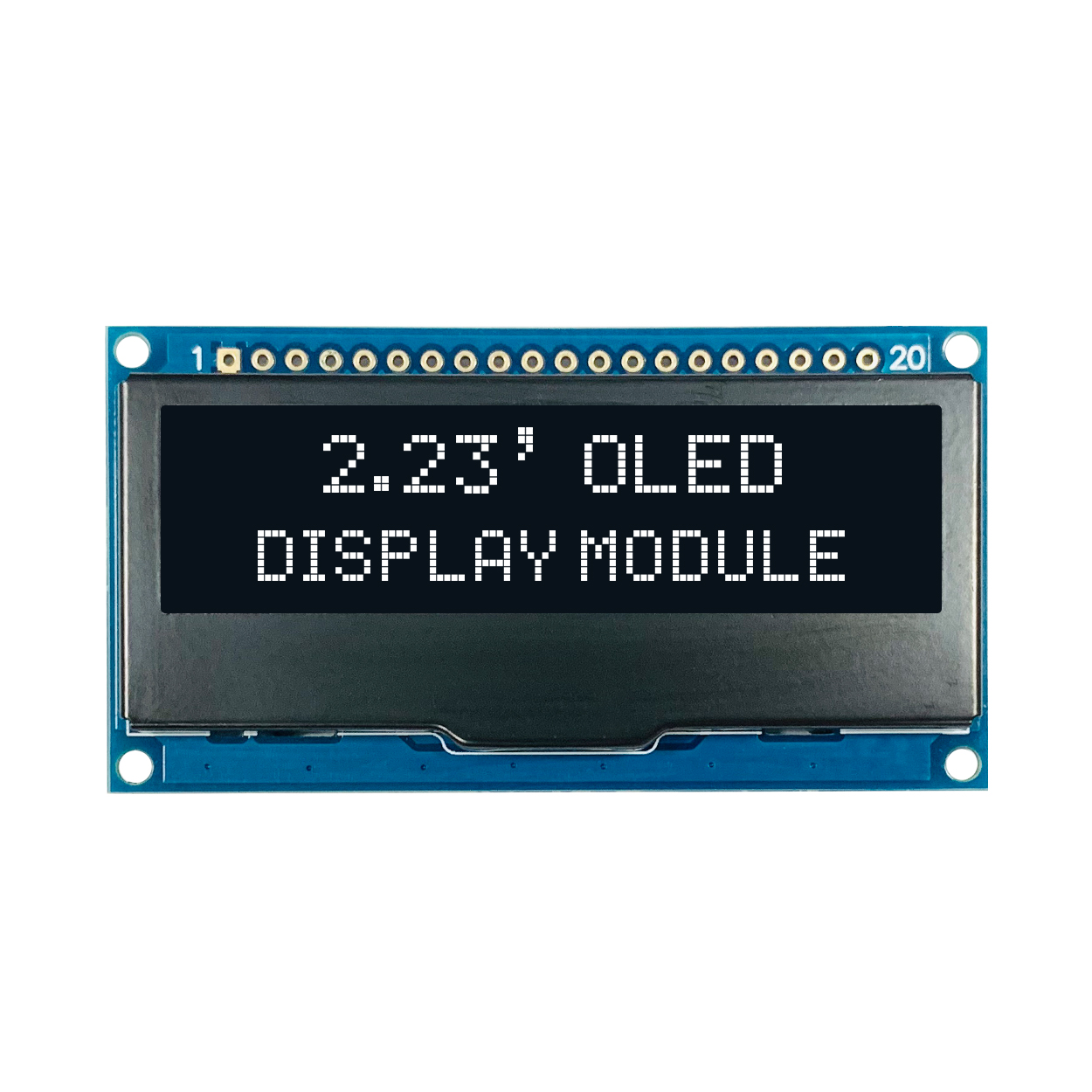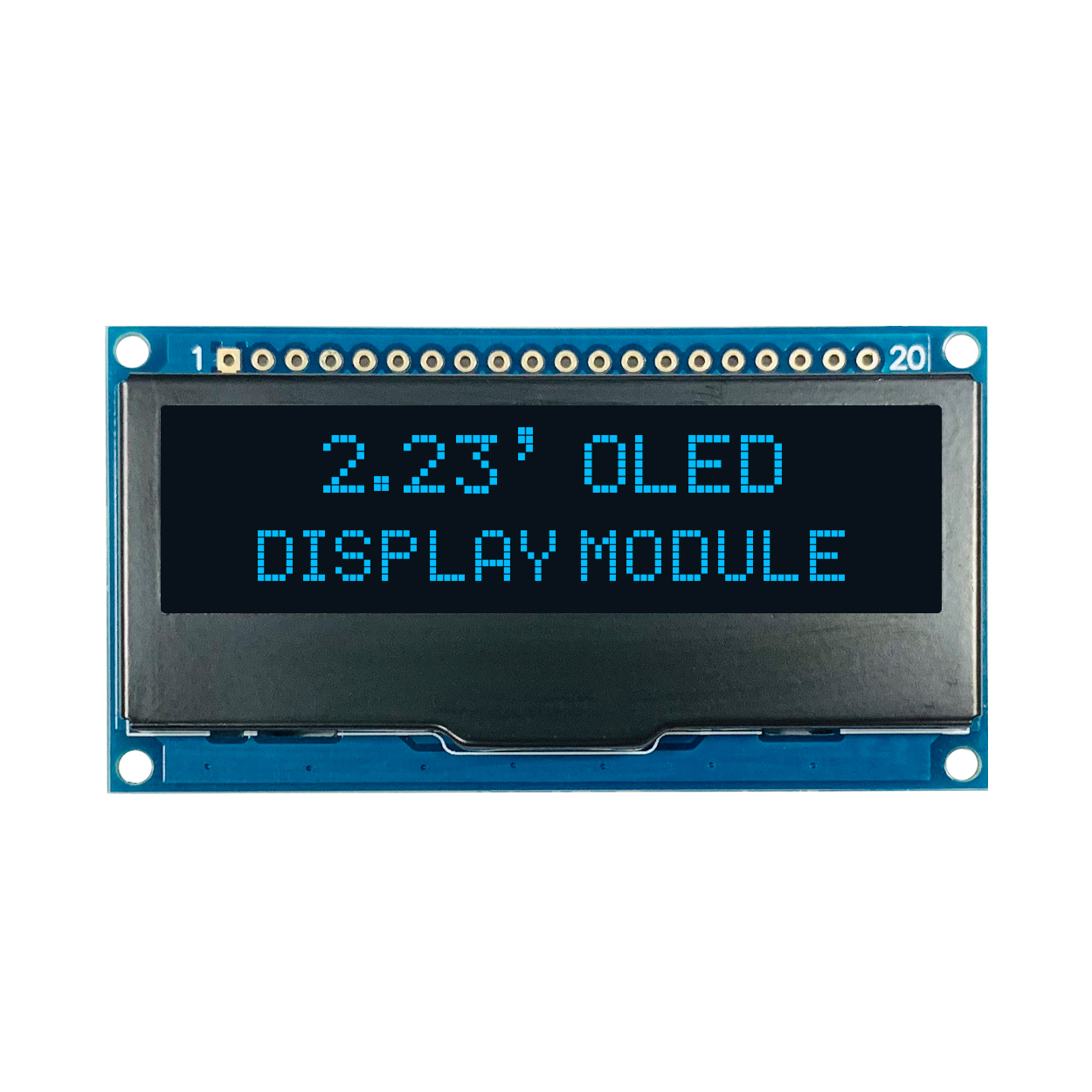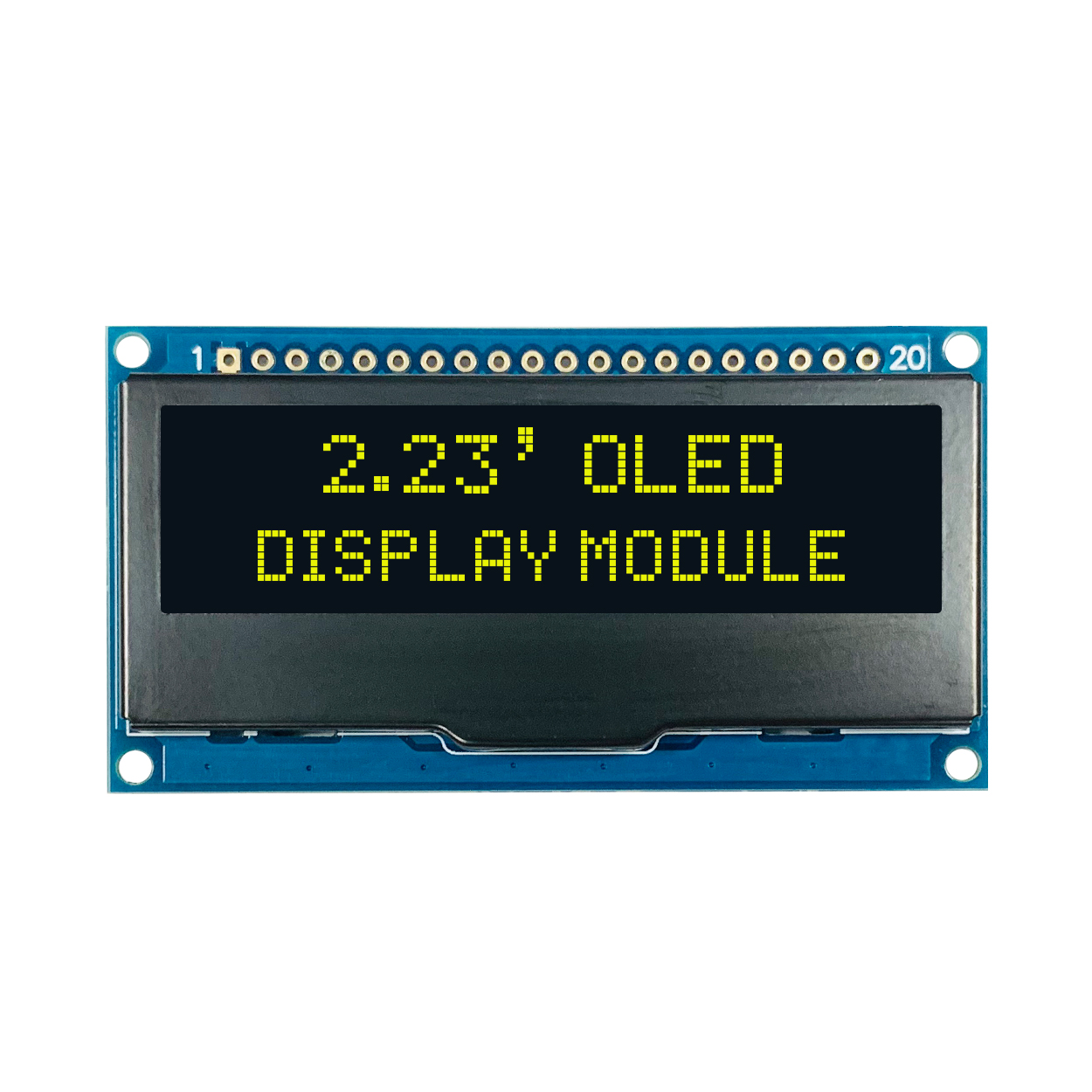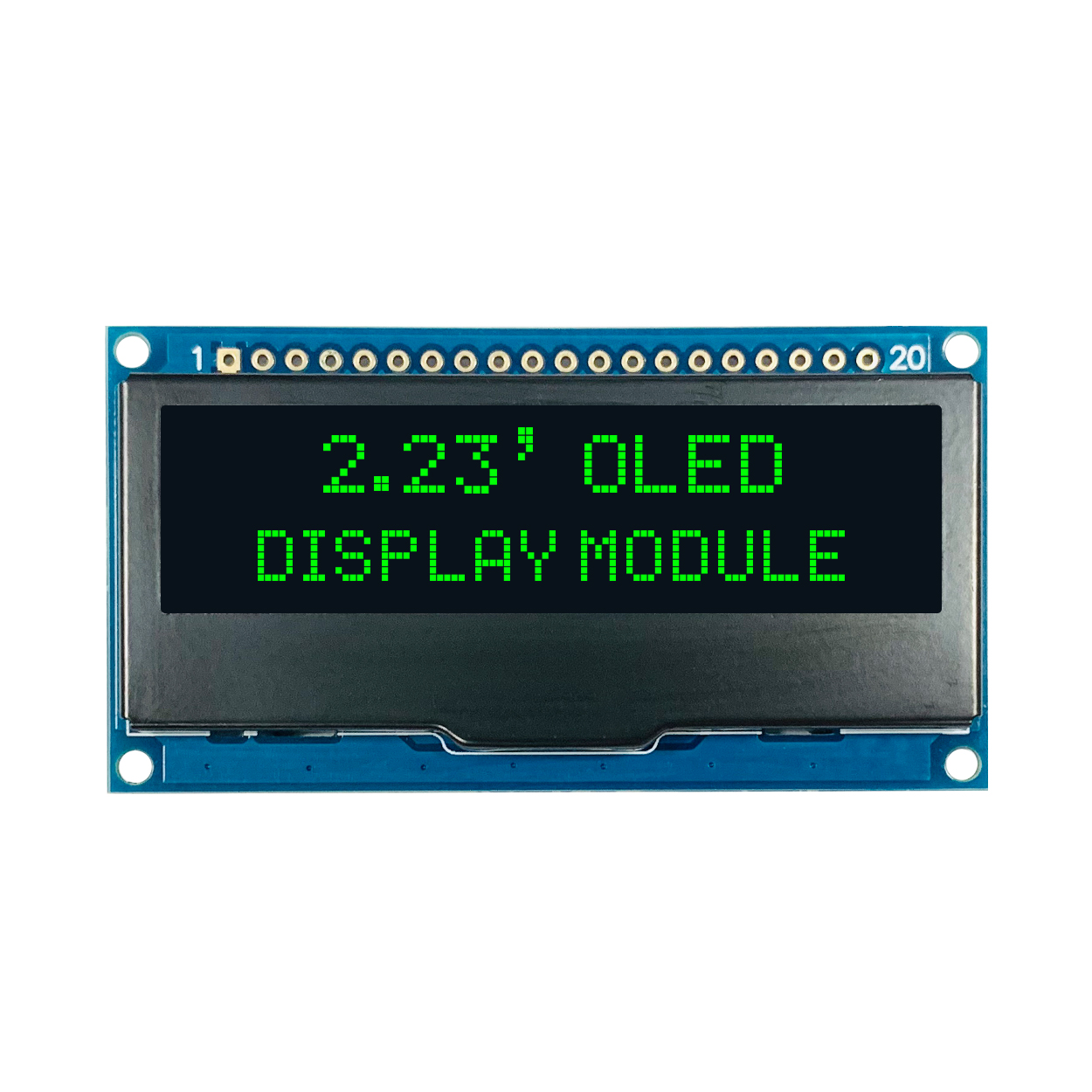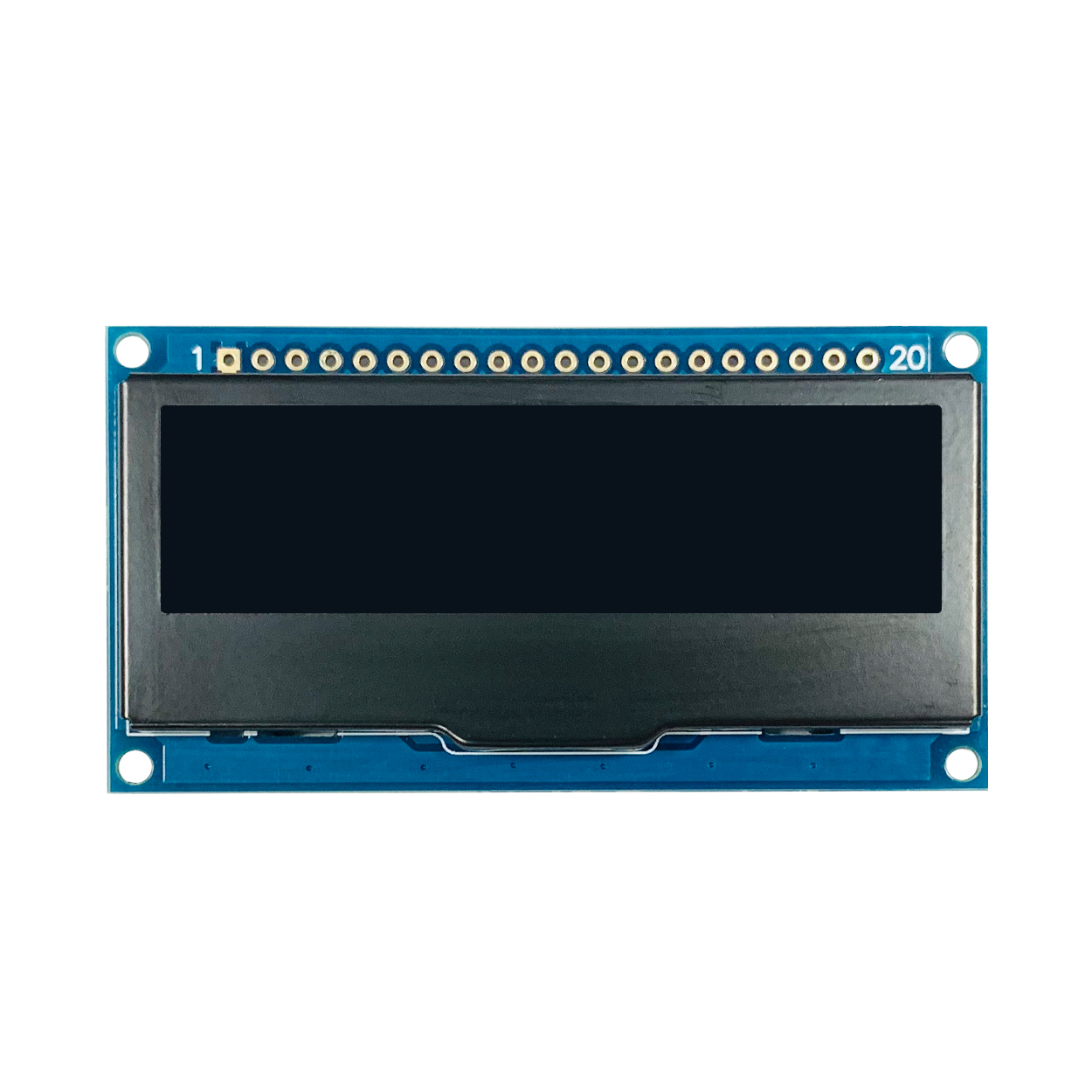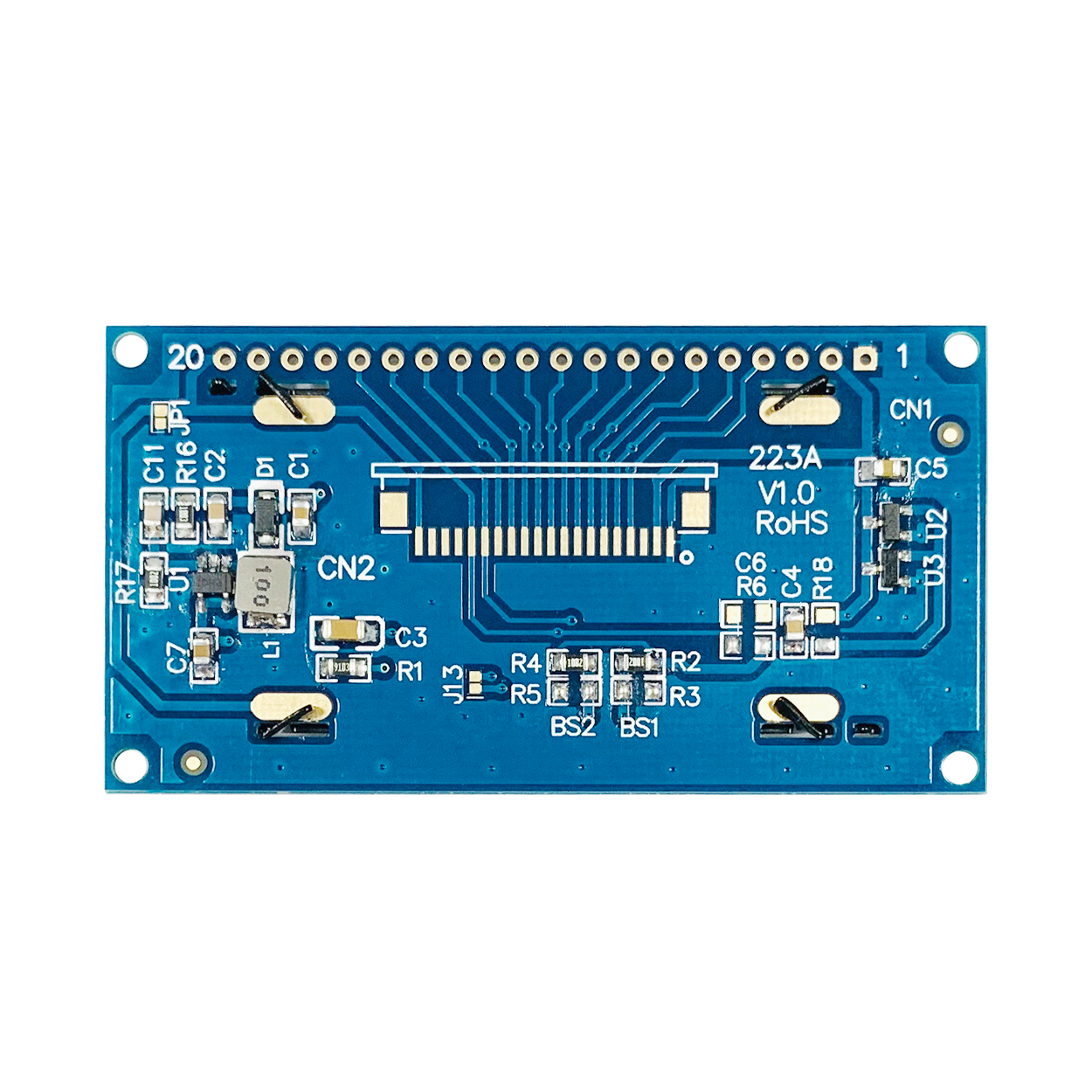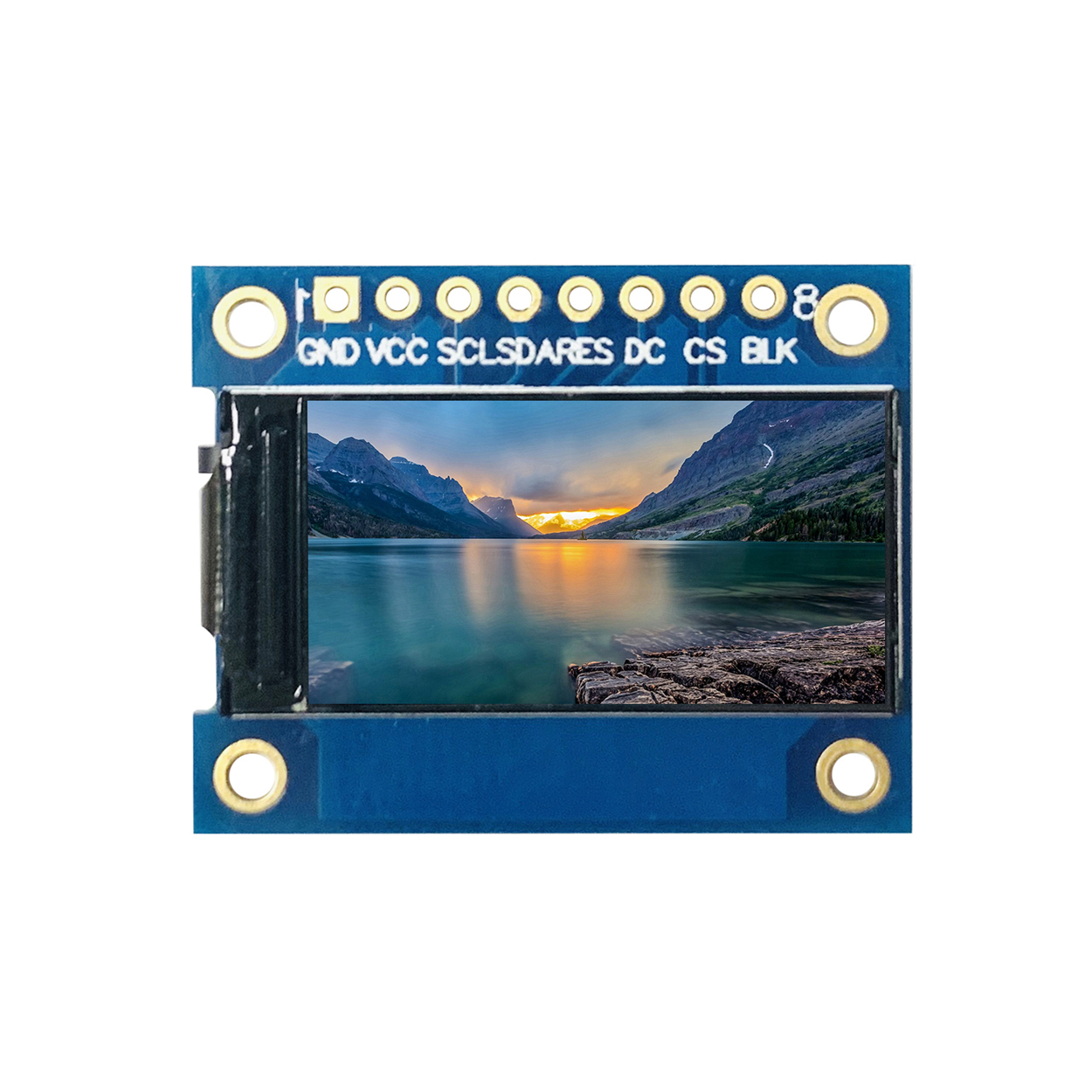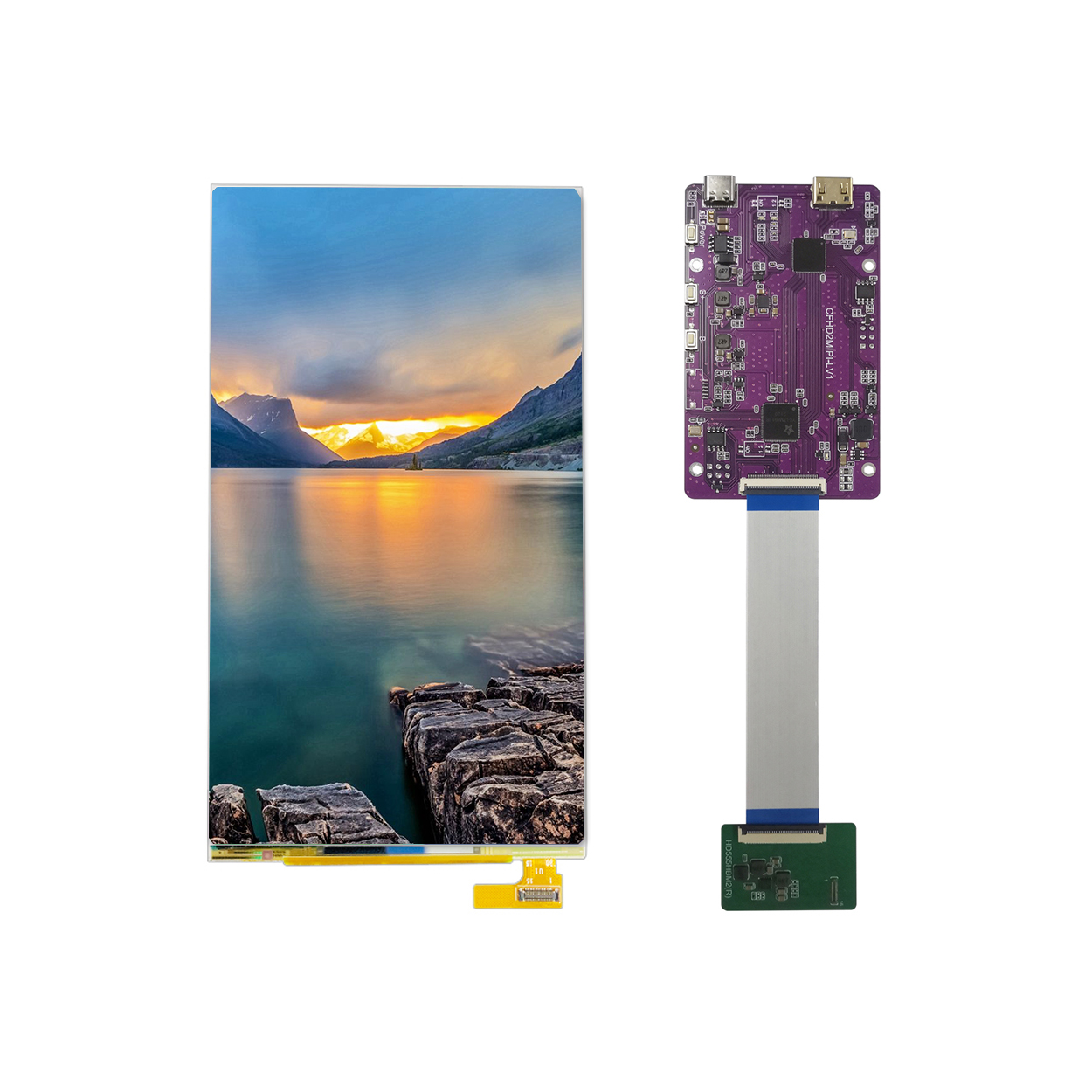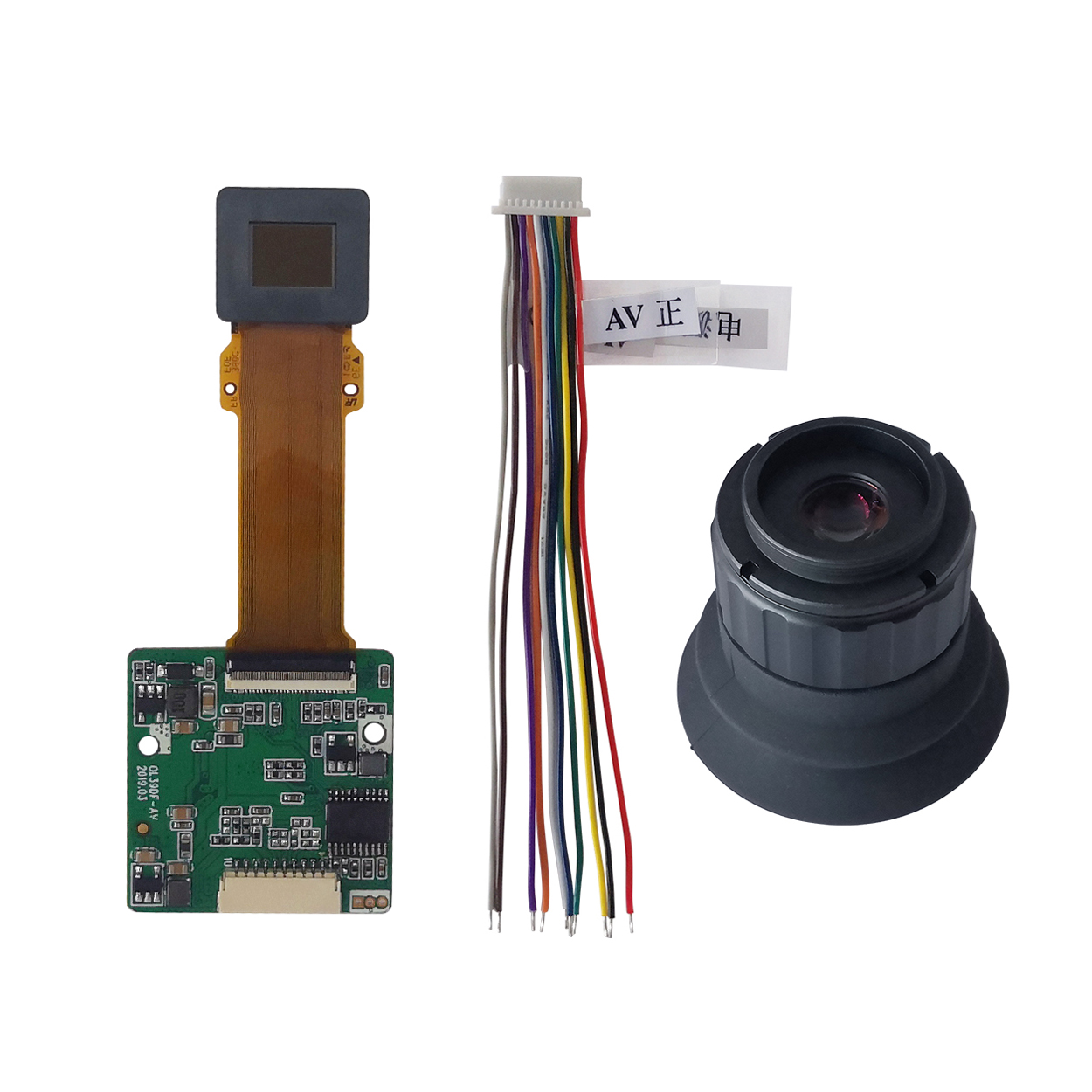
2.23″ OLED Display Module 128×32 White Graphic 20Pin SSD1305
Advanced Overview of the 2.23" OLED Display Module 128×32: A Technical Perspective
The 2.23-inch OLED Display Module, specifically the 128×32 white graphic version, offers a passive matrix display mode with a resolution of 128×32 pixels. Designed with flexibility in mind, it supports various monochrome color options, including white, blue, yellow, and green. This module utilizes the SSD1305/SSD1309 driver ICs and can interface via parallel, SPI, or I2C ports, offering versatility in integration with different systems. A compact design (66.5L × 35.0W × 8.8H mm) complements its efficient pixel layout, making it ideal for compact devices where space and power efficiency are essential. In this article, we will explore the technical attributes of this module, its key specifications, and its potential applications in modern technology.
Key Features of the 2.23" OLED Display Module
OLED display modules like the 2.23″ version are becoming increasingly prevalent due to their high-quality visuals, low power consumption, and compact form factor. The 128×32 resolution combined with monochrome color options makes it suitable for a range of low-power applications where clear, concise data display is critical. Below is an overview of the module’s key specifications:
| Recurso | Especificação |
|---|---|
| Modo de exibição | Matriz Passiva |
| Contagem de pixels | 128×32 |
| Cor da tela | Branco, Azul, Amarelo, Verde |
| Driver IC | SSD1305 / SSD1309 |
| Ciclo de trabalho | 1/64 Dever |
| Interface | Parallel, SPI, I2C |
| Contagem de pinos | 20 pinos |
| Tamanho do módulo | 66.5L × 35.0W × 8.8H mm |
| Área de visualização | 57.0 × 15.1 mm |
| Área efetiva | 55.02 × 13.1 mm |
| Tamanho do pixel | 0.41 × 0.39 mm |
| Distância entre pixels | 0.43 × 0.41 mm |
Advantages of OLED Display Technology
OLED (Organic Light Emitting Diode) technology has gained widespread adoption due to its distinct advantages over traditional LCD and LED displays. One key benefit is the ability to achieve true black levels. Unlike LCD displays, where backlighting can lead to light leakage, each pixel in an OLED display emits its own light. This provides sharper contrasts, brighter colors, and more vivid images.
Moreover, OLED displays are thinner and lighter than their LCD counterparts. This contributes to a reduced overall footprint for devices, which is crucial for mobile and portable electronics. Furthermore, OLEDs are energy-efficient, especially when displaying dark or black content, as the pixels are turned off when displaying black.
Application Scenarios for the 2.23" OLED Display Module
The 2.23″ OLED display module is an excellent choice for applications where high resolution and minimal power consumption are required. The module’s compact size makes it perfect for devices such as portable medical instruments, handheld devices, smartwatches, IoT devices, and various consumer electronics. It can also be used in industrial equipment or embedded systems where limited space and high visibility are necessary.
Given the high clarity and brightness of OLED displays, the module is often used in scenarios requiring clear, real-time data visualization—such as in sensor readouts, status displays, or low-power graphical interfaces. Its versatility in color options (white, blue, yellow, and green) further enhances its adaptability to various use cases.
Interface Options and Compatibility
The 2.23″ OLED display module provides flexibility in terms of interfacing with different hardware platforms. With support for parallel, SPI, and I2C communication protocols, this module can be integrated into a broad range of microcontrollers and processing units. These communication interfaces offer different advantages, depending on the specific requirements of the application.
- Parallel Interface: Ideal for high-speed communication, especially in applications requiring faster data transfer rates.
- Interface SPI: Offers a good balance between speed and complexity, making it suitable for most embedded systems with moderate communication requirements.
- Interface I2C: A low-speed, two-wire interface that is perfect for simple systems where only occasional data updates are needed.
The versatility of these interfaces allows engineers and developers to select the most appropriate one based on the desired speed, power consumption, and system complexity.
Module Dimensions and Pixel Layout
The compact dimensions of this module—66.5L × 35.0W × 8.8H mm—allow it to fit into applications with strict size constraints. The display area itself measures 57.0 × 15.1 mm, with an effective pixel area of 55.02 × 13.1 mm. This arrangement ensures that the display provides sufficient space for readable data or graphics while maintaining an efficient use of available space.
Each pixel in the 128×32 grid is sized at 0.41 × 0.39 mm, with a pixel pitch of 0.43 × 0.41 mm, providing a balance between pixel density and overall module size. This configuration ensures that the display maintains a sharp and clear visual output, making it ideal for text, icons, and small graphical elements.
Conclusão
The 2.23″ OLED Display Module 128×32 with a monochrome white graphic display offers an excellent solution for space-conscious designs that require high-quality visual output. Its passive matrix mode, low power consumption, and flexible interfacing options make it an ideal candidate for a range of applications in both consumer electronics and industrial devices. The versatility of the display color options and the compact size ensure that it meets the needs of a variety of embedded systems.
As the demand for efficient, space-saving, and visually clear displays continues to grow, OLED technology will play an increasingly important role in shaping the future of electronic devices. This module serves as an excellent example of how compact, low-power displays can drive innovation across many industries.
Desenho
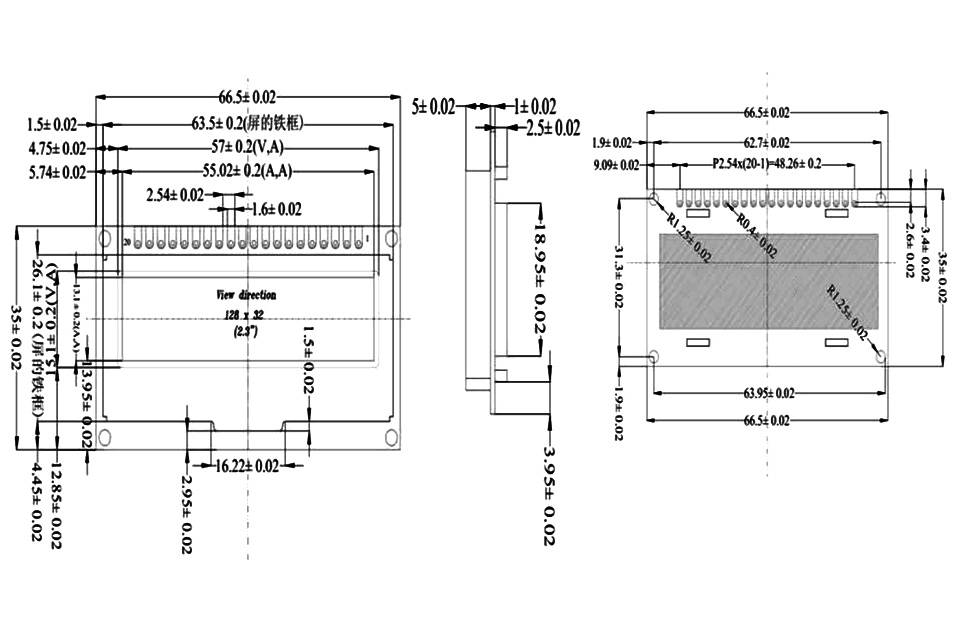
Descrição do Pin
| ITEM | SÍMBOLO | NÍVEL | FUNÇÃO |
|---|---|---|---|
| 1 | VSS | 0 | Terra de energia |
| 2 | VDD | 3~5V | Power Supply for Logic |
| 3 | V0 | Power supply for display module circuit | |
| 4 | /DC | A/E | Data / Command control |
| 5 | WR | A/E | H: Ler, L: Escrever |
| 6 | /RD | H, H->L | Habilitar sinal |
| 7 | D0 | A/E | Barramento de dados |
| 8-14 | D1-D7 | A/E | Barramento de dados |
| 15 | /CS | A/E | Seleção de chips |
| 16 | RES | A/E | Active LOW Reset signal (RC Reset circuit on board) |
| 17 | BS1 | A/E | Communication protocol select |
| 18 | BS2 | A/E | Communication protocol select |
| 19 | NC | — | Float or connect to VSS |
| 20 | FG | — | Chão de quadro |
Por que nos escolher
Base de conhecimento
A tecnologia evolui em um ritmo incrível, e permanecer à frente requer aprendizado contínuo e uma abordagem de mente aberta. Ao expandir continuamente nosso conhecimento, garantimos que continuamos líderes em nosso campo.
Junte-se a nós enquanto exploramos as últimas tendências e insights e aproveite a oportunidade para atualizar e aprofundar seu conhecimento sobre a tecnologia LCD!
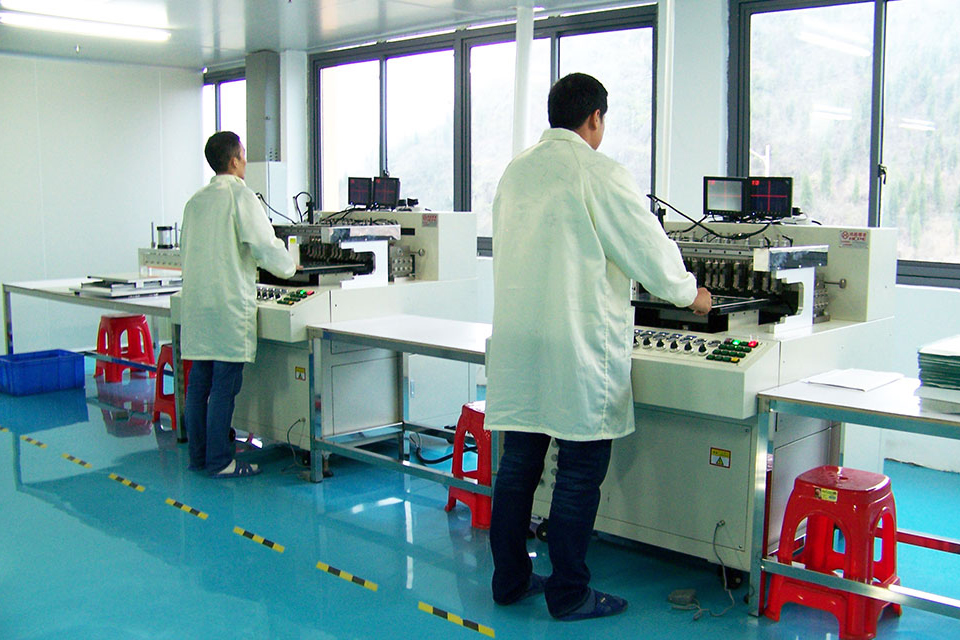
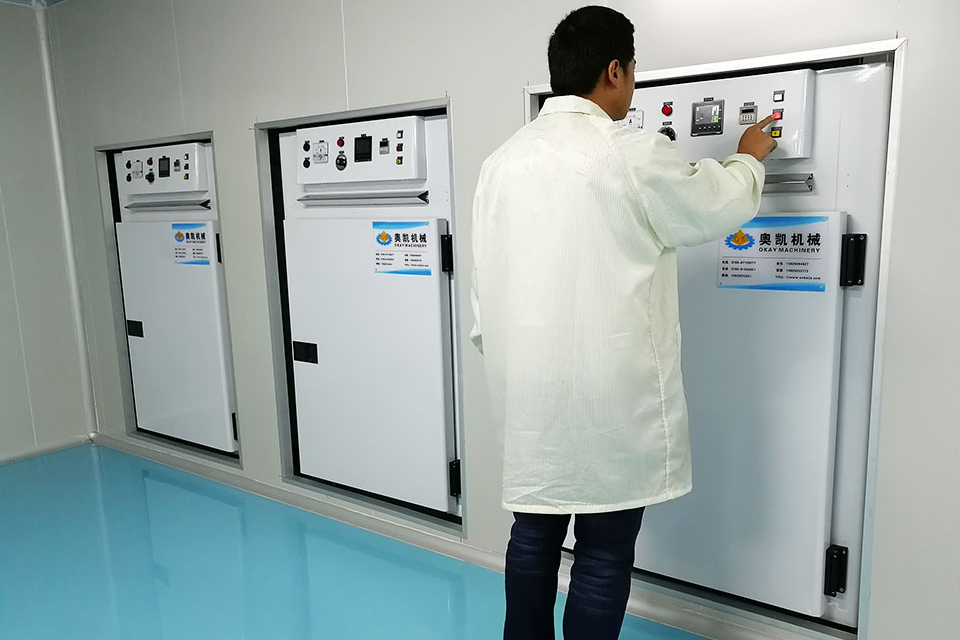
Nossos Valores Essenciais e Missão
Nosso objetivo é ser o fornecedor líder de soluções de LCD, entregando produtos de alta qualidade, atendimento ao cliente excepcional e fomentando relacionamentos baseados em confiança. Quando você trabalha conosco, você não é apenas um cliente – você se torna parte da nossa família.
Suas necessidades são nossa prioridade e nos dedicamos a garantir seu sucesso em cada etapa da jornada.
Nossas ofertas de produtos
Sejam nossas ofertas padrão ou uma solução personalizada, a qualidade é sempre nossa maior prioridade. Otimizamos constantemente nossos processos para entregar a melhor combinação de preços competitivos e entrega pontual. Nosso objetivo é fornecer valor excepcional ao mesmo tempo em que atendemos às suas necessidades específicas.
Explore nossa gama de produtos hoje mesmo e veja como podemos ajudar em seu próximo projeto!
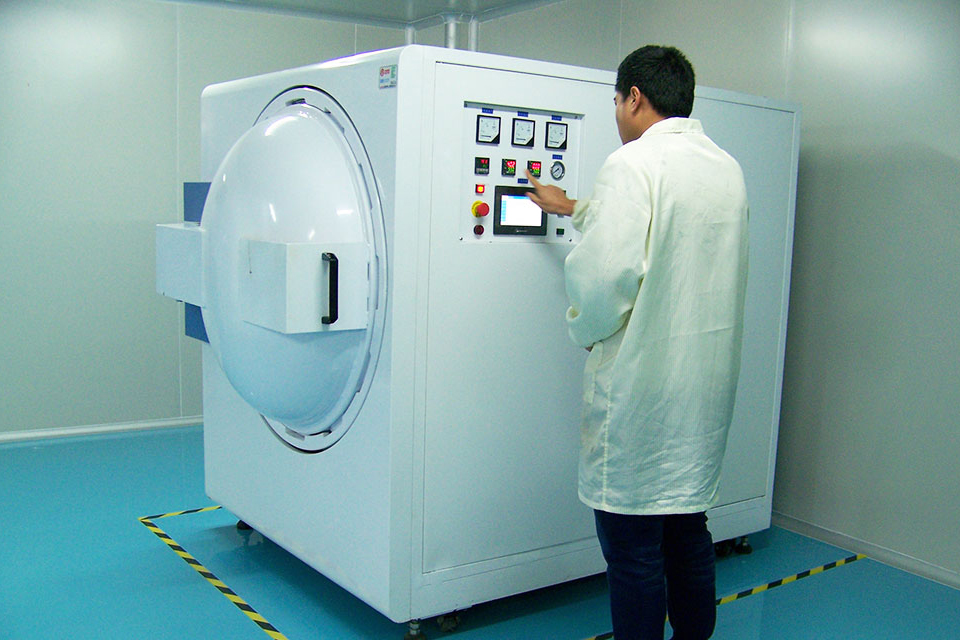
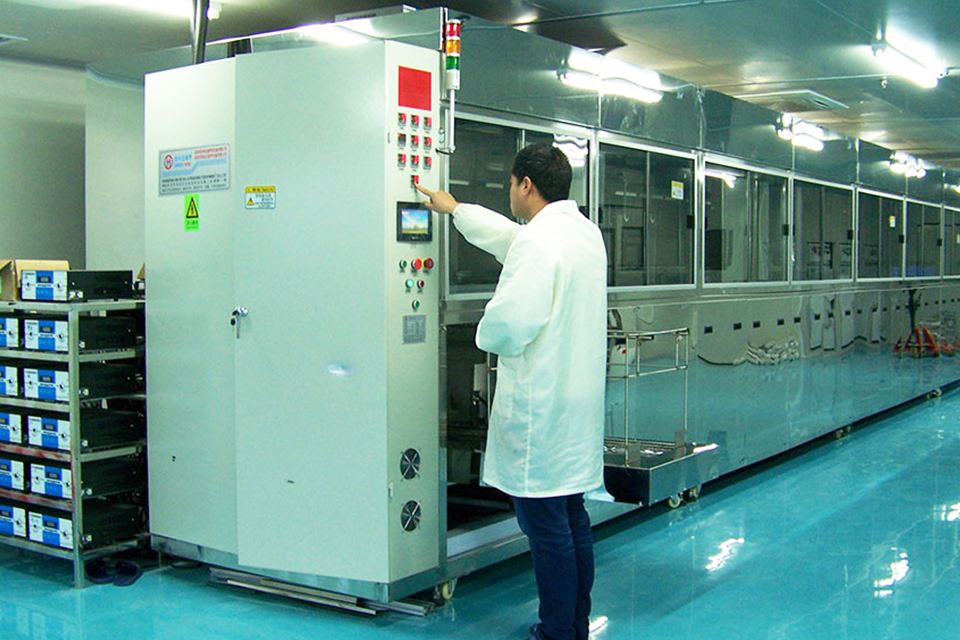
Suporte global ao cliente
Somos um fabricante e fornecedor de soluções LCD de serviço completo, especializado em uma ampla gama de produtos eletrônicos. Nossa expertise inclui displays TFT coloridos, LCDs incorporados, painéis de toque, aquecedores de LCD, backlights e LCDs de caracteres e gráficos.
Fornecendo soluções abrangentes para atender às diversas necessidades do setor. Venha descobrir as últimas tendências e insights.
Perguntas frequentes
The resolution of the 2.23″ OLED Display Module is 128×32 pixels.
The display supports four monochrome color options: white, blue, yellow, and green.
The module uses the SSD1305 or SSD1309 driver ICs.
The module supports three communication interfaces: parallel, SPI, and I2C.
Each pixel in the display measures 0.41 × 0.39 mm.
The pixel pitch is 0.43 × 0.41 mm.
The display operates with a 1/64 duty cycle.
The overall module size is 66.5L × 35.0W × 8.8H mm.
This module is ideal for use in portable medical devices, smartwatches, handheld electronics, IoT devices, and industrial equipment.
OLED technology provides higher contrast, true black levels, lower power consumption, thinner design, and more vibrant colors compared to traditional LCD and LED displays.

